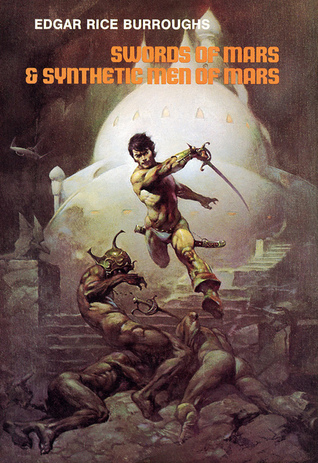What do you think?
Rate this book


345 pages, Hardcover
First published April 1, 1995
“There exists between Barsoom and her satellites a peculiar relation which I have called a compensatory adjustment of masses. For example, let us consider a mass traveling from Barsoom to Thuria. As it approaches the nearer moon, it varies directly as the influences of the planet and the satellite vary.”
The most remarkable feature of the following two days was the fact that we survived them.
“It all sounds like a mad dream to me,” said Jat Or.
“I fully agree with you,” I replied, “but you will have to admit that it is going to be a most interesting dream.”
The malagors flew swiftly and smoothly. My guess would be that they flew at a speed of more than four hundred haads a zode (about sixty miles an hour).
“Come,” said Ras Thavas, “to the spawning of the monsters. We may be needed.”